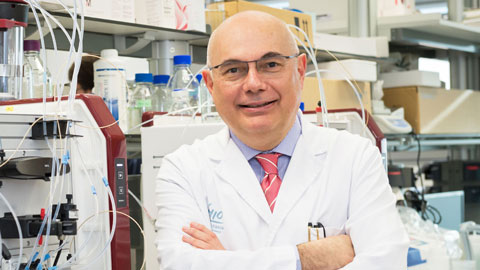Josep Tabernero, winner of the National Research Award

The Catalan Government and the FCRI awarded the 2019 National Research Award to Dr Josep Tabernero, lecturer of the UAB Department of Medicine, director of the Vall d’Hebron Institute of Oncology (VHIO) and head of the Oncology Unit at the Vall d’Hebron University Hospital.
29/06/2020
Dr Tabernero graduated with a first class honours degree in Medicine and Surgery in 1987 and went on to earn his PhD in Medicine and Surgery at the Universitat Autònoma de Barcelona (UAB). He has become one of the most important researchers who has made great contributions internationally in the field of cancer research, partucularly in the field of grastrointestinal tumours and molecular therapy.
The National Research Award is given in recognition of researchers who have recently contributed to the advancement of scientific disciplines in any of the following fields: human and social sciences, life and health sciences, engineering and technology, and experimental sciences. The award, which includes a cash prize of €40,000, this year acknowledges the enromous tasks of the UAB Department of Medicine professor Josep Tabernero, for his pioneering advancements in medical oncology and precision oncology, such as his discovery of new mechanisms involved in the development of tumours and the design of more precise and effective, tailor-made cancer treatments.
Dr Tabernero is also head of the Molecular Cancer Therapy Research Unit (UITM) at the "la Caixa" Foundation, which focuses on clinical trials of molecular therapies. He also has been involved with the development of different treatments for colorectal cancer which today form part of the standard treatment. Based on the concept that each tumour contains a different genetic identity, Dr Tabernero's research group works on the development of molecular therapies aimed at specific oncoproteins, with the objective of creating personalised treatments.
His team's research seeks to find new prognosis and predictive markers of response to several treatments and other resistance markers, both at a primary (innate) and at a secondary (treatment responsive) level. These markers are genetic characteristics of the tumour and tissues conditioning the response of the tumour. Dr Tabernero and his group have pioneered the development of early stage drugs (in the initial stages of development) to treat intestinal cancers, as well as in associated preclinical and translational research, in which they include innovative experimental tools related to liquid biopsies, xenografts in animal models (mice) and the first ever definition of the molecular subtypes of colorectal cancer.
Other Award Winners
In the Young Talent category, the National Research Award was also given to Sílvia Osuna, ICREA researcher lecturer at the Institute of Computational Chemistry and Catalysis (IQCC) of the University of Girona (UdG). Sílvia Osuna specialises in the study of biochemical processes related to the enzymatic catalysis and the development of simulations and computational tools for the design of new enzymes that are of interest to the pharmaceutical industry.
The Spanish Association Against Cancer's Science Foundation (FCAECC) also received the award in the category of Scientific Patronage for its efforts in funding cancer research in Catalonia. The Catalan Association of Scientific Communication (ACCC) was awarded in the category of Scientific Communication for its 30 years as a leader in science popularisation in Catalonia; while the R&I Public-Private Partnership Award went to Ricoh Additive Manufacturing Center (Ricoh-CIM UPC), for its joint launch of the industrial 3D printing of complex geometric shapes and customised components.